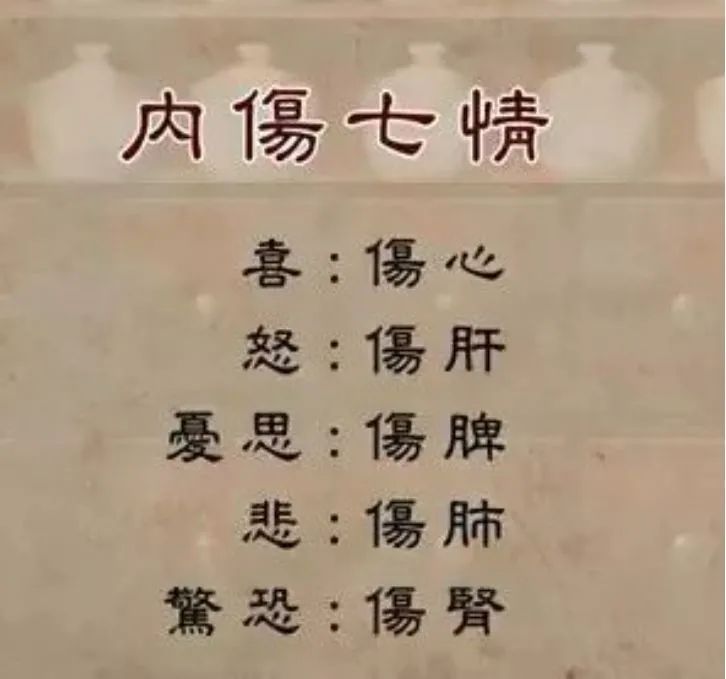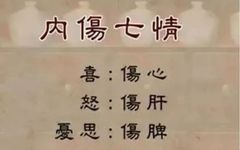 Qiqing Neishang (Internal Injuries of Seven Emotions) is a category of pathogenic factors that cause dysfunction of the internal organs’ essence and qi, leading to the occurrence or triggering of diseases.The internal injuries caused by the seven emotions directly damage the essence and qi of the internal organs, which can lead to or trigger various emotional and physical illnesses. The seven emotions refer to joy, anger, worry, thought, sadness, fear, and shock, which are normal emotional activities of the human body in response to changes in the internal and external environment. Generally, these emotional experiences do not lead to or trigger diseases. However, when the seven emotions become excessive, surpassing the body’s physiological and psychological adaptive and regulatory capabilities, they can damage the essence and qi of the internal organs, leading to dysfunction or weakness of the body’s righteous qi, and a reduced ability to adapt to and regulate emotional stimuli, thus causing or triggering diseases. At this point, the seven emotions become the pathogenic factor, referred to as Qiqing Neishang.
Qiqing Neishang (Internal Injuries of Seven Emotions) is a category of pathogenic factors that cause dysfunction of the internal organs’ essence and qi, leading to the occurrence or triggering of diseases.The internal injuries caused by the seven emotions directly damage the essence and qi of the internal organs, which can lead to or trigger various emotional and physical illnesses. The seven emotions refer to joy, anger, worry, thought, sadness, fear, and shock, which are normal emotional activities of the human body in response to changes in the internal and external environment. Generally, these emotional experiences do not lead to or trigger diseases. However, when the seven emotions become excessive, surpassing the body’s physiological and psychological adaptive and regulatory capabilities, they can damage the essence and qi of the internal organs, leading to dysfunction or weakness of the body’s righteous qi, and a reduced ability to adapt to and regulate emotional stimuli, thus causing or triggering diseases. At this point, the seven emotions become the pathogenic factor, referred to as Qiqing Neishang. The pathogenic characteristics of Qiqing Neishang:Since emotional activities are triggered by changes in the internal and external environment, changes in living and working conditions, poor interpersonal relationships, and weakness of the internal organs’ essence and qi, as well as disharmony of qi and blood, can all lead to abnormal emotional responses, thus resulting in disease. Whether the seven emotions can cause disease is closely related not only to the intensity and manner of the emotional response but also to the individual’s psychological characteristics and physiological state. The pathogenicity of Qiqing Neishang includes two aspects: one is the occurrence or triggering of diseases; the other is the influence on the development and outcome of the disease.(1) Directly injuring the internal organsThe seven emotions are complex psychological responses of the body to changes in the internal and external environment, based on the essence and qi of the internal organs. Therefore, excessive emotional responses can directly injure the internal organs. Since the heart houses the spirit and is the master of the internal organs, emotional injuries will primarily affect the heart spirit, subsequently impacting the corresponding internal organs, leading to abnormal metabolism of essence and qi and chaotic qi dynamics, resulting in disease.(2) Affecting the qi dynamics of the internal organsThe movement and changes of qi in the internal organs play an important role in emotional activities. However, the ascending and descending movements of the qi in the internal organs are regulated by the heart spirit. Therefore, emotional diseases primarily injure the heart spirit, which then affects the qi dynamics of the internal organs, leading to abnormal ascending and descending qi dynamics and corresponding clinical manifestations. As stated in the Suwen (Plain Questions) chapter on pain: “All diseases arise from qi; anger causes qi to rise, joy causes qi to relax, sadness causes qi to dissipate, fear causes qi to descend… shock causes qi to become chaotic, and thought causes qi to stagnate.”Anger causes qi to rise: This refers to excessive anger leading to excessive liver qi dispersal, causing qi to ascend, and in severe cases, blood may follow the qi upwards, resulting in pathological changes. Clinically, this is primarily manifested as headaches, facial redness, vomiting blood, and in severe cases, fainting or collapse. The Suwen states: “Great anger leads to the cessation of qi, causing blood to accumulate above, resulting in fainting.” The Suwen also states: “Anger causes qi to reverse, leading to vomiting blood and other symptoms.” The Suwen further states: “When blood and qi ascend together, it leads to great fainting; if qi returns, one lives; if it does not return, one dies.”Joy causes qi to relax: This refers to excessive joy harming the heart, leading to the dispersal of heart qi, and in severe cases, the heart qi may escape or the spirit may not be settled. Clinically, this can manifest as an inability to concentrate, and in severe cases, mental disturbances, mania, or symptoms of excessive sweating and weak pulse.Sadness causes qi to dissipate: This refers to excessive sadness harming the lungs, leading to the loss of lung function and depletion of lung qi. Clinically, this often presents as depression, lack of energy, shortness of breath, chest tightness, and fatigue. The Suwen states: “Sadness causes the heart to be anxious, the lungs to lose their function, and the upper jiao to be obstructed, causing heat to accumulate internally, thus qi dissipates.”Fear causes qi to descend: This refers to excessive fear harming the kidneys, causing the kidney qi to lose its stability and qi to descend. Clinically, this can present as incontinence or even nocturnal emissions. The Lingshu states: “Fear and anxiety can harm the essence; when the essence is harmed, the bones become weak and the body may collapse.”Shock causes qi to become chaotic: This refers to sudden shock injuring the heart and kidneys, leading to instability of the heart spirit and chaotic qi dynamics. Clinically, this can present as palpitations, anxiety, and in severe cases, mental confusion. The Suwen states: “Shock causes the heart to have no support, the spirit to have no home, and the thoughts to have no focus, thus qi becomes chaotic.”Thought causes qi to stagnate: This refers to excessive thinking harming the spleen, leading to stagnation of spleen qi and dysfunction in transformation and transportation. Symptoms may include loss of appetite, abdominal distension, constipation, or diarrhea. The Suwen states: “Thinking causes the heart to have a focus, the spirit to have a home, and the righteous qi to remain and not move, thus qi stagnates.”Internal injuries from emotions can lead to disharmony of the internal organs’ qi dynamics, and disharmony of qi dynamics can obstruct the body’s qi transformation process, causing abnormal metabolism of essence, qi, blood, and body fluids, thus leading to various diseases. Prolonged qi stagnation can transform into heat or fire; excessive upward qi can also transform into heat or fire, leading to internal heat generation. The distribution of essence, blood, and body fluids can be obstructed due to qi stagnation, resulting in conditions such as blood stasis, phlegm accumulation, etc., and the combination of phlegm and blood stasis can lead to chest obstruction, tumors, and other issues.(3) Commonly manifesting as emotional diseasesEmotional diseases refer to conditions related to emotional stimuli, characterized by abnormal emotional manifestations. Emotional diseases include: ① diseases triggered by emotional stimuli, such as depression, mania, and frenzy; ② diseases induced by emotional stimuli, such as chest obstruction, true heart pain, dizziness (hypertension), and other psychosomatic diseases; ③ other diseases caused by different reasons but exhibiting abnormal emotional manifestations, such as diabetes, malignant tumors, chronic liver and gallbladder diseases, which often have abnormal emotional presentations.(4) Changes in the seven emotions affect the diseaseChanges in the seven emotions have a dual impact on the disease: one is beneficial for recovery. Positive and optimistic emotions, appropriate emotional responses, expressing anger when angry, sadness when sad, without excessive anger or depression, can facilitate improvement and even recovery of the disease. The other is that negative emotions can trigger disease onset or worsen the condition. Depressed emotions, pessimism, or abnormal fluctuations in the seven emotions can provoke disease onset or exacerbate the condition. Understanding the positive and negative impacts of emotional activities on the disease is practically significant for grasping the development and changes of the disease and for implementing comprehensive and correct treatment.
The pathogenic characteristics of Qiqing Neishang:Since emotional activities are triggered by changes in the internal and external environment, changes in living and working conditions, poor interpersonal relationships, and weakness of the internal organs’ essence and qi, as well as disharmony of qi and blood, can all lead to abnormal emotional responses, thus resulting in disease. Whether the seven emotions can cause disease is closely related not only to the intensity and manner of the emotional response but also to the individual’s psychological characteristics and physiological state. The pathogenicity of Qiqing Neishang includes two aspects: one is the occurrence or triggering of diseases; the other is the influence on the development and outcome of the disease.(1) Directly injuring the internal organsThe seven emotions are complex psychological responses of the body to changes in the internal and external environment, based on the essence and qi of the internal organs. Therefore, excessive emotional responses can directly injure the internal organs. Since the heart houses the spirit and is the master of the internal organs, emotional injuries will primarily affect the heart spirit, subsequently impacting the corresponding internal organs, leading to abnormal metabolism of essence and qi and chaotic qi dynamics, resulting in disease.(2) Affecting the qi dynamics of the internal organsThe movement and changes of qi in the internal organs play an important role in emotional activities. However, the ascending and descending movements of the qi in the internal organs are regulated by the heart spirit. Therefore, emotional diseases primarily injure the heart spirit, which then affects the qi dynamics of the internal organs, leading to abnormal ascending and descending qi dynamics and corresponding clinical manifestations. As stated in the Suwen (Plain Questions) chapter on pain: “All diseases arise from qi; anger causes qi to rise, joy causes qi to relax, sadness causes qi to dissipate, fear causes qi to descend… shock causes qi to become chaotic, and thought causes qi to stagnate.”Anger causes qi to rise: This refers to excessive anger leading to excessive liver qi dispersal, causing qi to ascend, and in severe cases, blood may follow the qi upwards, resulting in pathological changes. Clinically, this is primarily manifested as headaches, facial redness, vomiting blood, and in severe cases, fainting or collapse. The Suwen states: “Great anger leads to the cessation of qi, causing blood to accumulate above, resulting in fainting.” The Suwen also states: “Anger causes qi to reverse, leading to vomiting blood and other symptoms.” The Suwen further states: “When blood and qi ascend together, it leads to great fainting; if qi returns, one lives; if it does not return, one dies.”Joy causes qi to relax: This refers to excessive joy harming the heart, leading to the dispersal of heart qi, and in severe cases, the heart qi may escape or the spirit may not be settled. Clinically, this can manifest as an inability to concentrate, and in severe cases, mental disturbances, mania, or symptoms of excessive sweating and weak pulse.Sadness causes qi to dissipate: This refers to excessive sadness harming the lungs, leading to the loss of lung function and depletion of lung qi. Clinically, this often presents as depression, lack of energy, shortness of breath, chest tightness, and fatigue. The Suwen states: “Sadness causes the heart to be anxious, the lungs to lose their function, and the upper jiao to be obstructed, causing heat to accumulate internally, thus qi dissipates.”Fear causes qi to descend: This refers to excessive fear harming the kidneys, causing the kidney qi to lose its stability and qi to descend. Clinically, this can present as incontinence or even nocturnal emissions. The Lingshu states: “Fear and anxiety can harm the essence; when the essence is harmed, the bones become weak and the body may collapse.”Shock causes qi to become chaotic: This refers to sudden shock injuring the heart and kidneys, leading to instability of the heart spirit and chaotic qi dynamics. Clinically, this can present as palpitations, anxiety, and in severe cases, mental confusion. The Suwen states: “Shock causes the heart to have no support, the spirit to have no home, and the thoughts to have no focus, thus qi becomes chaotic.”Thought causes qi to stagnate: This refers to excessive thinking harming the spleen, leading to stagnation of spleen qi and dysfunction in transformation and transportation. Symptoms may include loss of appetite, abdominal distension, constipation, or diarrhea. The Suwen states: “Thinking causes the heart to have a focus, the spirit to have a home, and the righteous qi to remain and not move, thus qi stagnates.”Internal injuries from emotions can lead to disharmony of the internal organs’ qi dynamics, and disharmony of qi dynamics can obstruct the body’s qi transformation process, causing abnormal metabolism of essence, qi, blood, and body fluids, thus leading to various diseases. Prolonged qi stagnation can transform into heat or fire; excessive upward qi can also transform into heat or fire, leading to internal heat generation. The distribution of essence, blood, and body fluids can be obstructed due to qi stagnation, resulting in conditions such as blood stasis, phlegm accumulation, etc., and the combination of phlegm and blood stasis can lead to chest obstruction, tumors, and other issues.(3) Commonly manifesting as emotional diseasesEmotional diseases refer to conditions related to emotional stimuli, characterized by abnormal emotional manifestations. Emotional diseases include: ① diseases triggered by emotional stimuli, such as depression, mania, and frenzy; ② diseases induced by emotional stimuli, such as chest obstruction, true heart pain, dizziness (hypertension), and other psychosomatic diseases; ③ other diseases caused by different reasons but exhibiting abnormal emotional manifestations, such as diabetes, malignant tumors, chronic liver and gallbladder diseases, which often have abnormal emotional presentations.(4) Changes in the seven emotions affect the diseaseChanges in the seven emotions have a dual impact on the disease: one is beneficial for recovery. Positive and optimistic emotions, appropriate emotional responses, expressing anger when angry, sadness when sad, without excessive anger or depression, can facilitate improvement and even recovery of the disease. The other is that negative emotions can trigger disease onset or worsen the condition. Depressed emotions, pessimism, or abnormal fluctuations in the seven emotions can provoke disease onset or exacerbate the condition. Understanding the positive and negative impacts of emotional activities on the disease is practically significant for grasping the development and changes of the disease and for implementing comprehensive and correct treatment.

